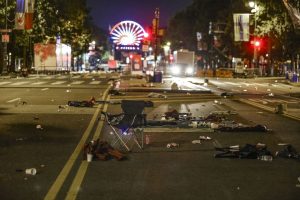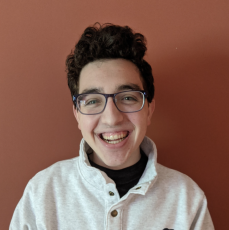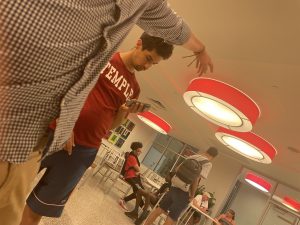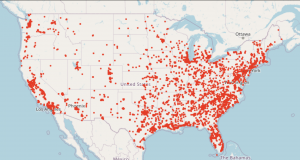
Debris left behind after people fled when gunshots were fired during the July 4th fireworks show in Philadelphia. (Steven M. Falk/The Philadelphia Inquirer via AP)
I met Adam Monday night July 4th in a random apartment building on the Parkway in Philadelphia. His head rested in his hands, his feet shook, and his voice whimpered. As an unsettling bombardment of fireworks and gunshots fired 50 feet away from us, I walked up to him, and he looked up to me. The words barely tumbled out of his mouth, the shock still placed on his young shoulders as he said to me, a near stranger, “I want to go home. I want my brother.”
There was an active shooter less than a three minute walk from where we were. Adam’s parents weren’t answering his calls and he couldn’t find his brother. They, like my friend group and many others, fled from the Philadelphia Museum of Art and were separated when shots were fired nearby around 9:47 pm Monday night. A few gun shots had punctured the blissful serenity of July 4th, causing a blend of fear, adrenaline, and anxiety to gush out in a wave of petrified emotions, all of which twisted throughout Adam.
Despite the chaos, the national media has scarcely reported on the shooting in Philadelphia as it does not qualify as a mass shooting. Therein lies the problem: while a disturbing epidemic, mass shootings account for a sliver of a fraction of a minority of gun deaths in the U.S. The larger issue, the one rarely focused on, are daily shootings like the one in Philadelphia where “only” a few people are injured or killed. To date in 2022, over 22,000 people have died as a result of non-mass shooting gun deaths compared with the 340 people murdered as a result of mass shootings. These events, unfortunately, have led to hundreds of Adams throughout the United States.
These statistics paint an explicit picture: the U.S. has a gun problem predominantly centered on suicides and handguns, not mass shootings and AR-15s. Maps displaying mass shootings are shocking; maps showing the number of deaths from all shootings appalling. Solving the mass shooting epidemic must go hand-in-hand with the handgun epidemic. This isn’t to diminish the atrocity of a mass shooting, only to point out that, unfortunately, there exists much more that is wrong in our country and much more that we can do.
The depressing irony between my experience this week and my work isn’t lost on me. My partner in the field, Julia Holladay, has worked tirelessly with Children’s Peace Initiative Kenya (CPIK) to help African tribes end their feuding, partly driven by the use of guns. And yet, it was me, not Julia, receiving a text expressing gratitude that I was safe. It was me, not Julia, spending a late night and into the early morning reuniting a ten year old with his family. It was me, the one living in suburban Philadelphia and not Julia in Kenya, who was just a few feet away from a live shooting.
Solving this larger gun problem first requires a cultural shift by the media, politicians, and everyday individuals to focus on mass shootings as well as other gun violence.
One institutional based idea inspired by my work for CPIK: instituting community based gun buyback programs which will create a difficult to attain, yet possible balance between respecting gun rights and promoting safety for non-mass shooting violence. The appeal of gun buyback programs lies in their ability to simultaneously reduce the amount of guns in a community, provide a method to safely dispose of firearms, and, importantly, to lead to a cultural shift away from guns.
The need for a solution became painstakingly clear when I woke up the morning after the fourth to a phone call from an unknown number. The voice on the other line sounded young and shy, no more than six years old. He said to me, “Hi, I am Adam’s brother. Thank you for helping him and his brother get home safe.” He hung up before I could reply, the silence permeating the now empty airwaves.
While thankful that Adam and his brother were home safe, I couldn’t help but replay Adam’s fearful words from the building lobby I had found him in just a few hours earlier: “Why is this happening? Is it safe to leave now?”
Posted By Daniel Gurevitch
Posted Jul 7th, 2022




2 Comments
Iain Guest
July 7, 2022
Remarkably sad and powerful blog, Daniel, with some very appropriate observations about the gun culture in North Kenya and the US. Sadly, we’re in no position to lecture the rest of the world about gun violence, but we can certainly help without moralizing, as you and Julia are doing this summer. As for this country, we face a mountain on challenges, from the gun lobby to the Supreme Court. It would be interesting to compare the success of gun buy-back initiatives in the Kenya and the US…. …
Jane Kinyua
July 25, 2022
Thank you Daniel for your reflective post. The gun violence issue though different in its manifestation when we compare Kenya and the US, the end results is the same- death of innocent people. The numbers of mass shooting and gun violence in the US are very alarming. It felt sad when recently someone from Africa asked me whether I am safe! I couldn’t have expected that but it’s evident that the frequency of mass shooting has blurred the glory of being in the US despite all the privileges that comes with it. I think lasting change lies in educating the young generations to re-define the why and the why not when it comes to the issue of gun control and most importantly seek new ways to rebuild communities